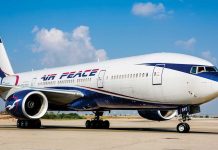The Director-General of the Nigerian Civil Aviation Authority (NCAA), Capt. Musa Nuhu has restated the commitment of the regulatory agency to cooperate with other service providers to ensure that the Nigerian airspace is safe and that airlines operate airworthy aircraft in order to sustain and improve on the existing safety record.
No accident involving scheduled airliner has been recorded in Nigeria since 2013 after the ill-fated Associated Aviation Flight 361, which crashed at the Murtala Muhammed International Airport, Lagos, killing 15 persons on board.
Nuhu said the high safety record would be sustained when there is synergy among industry stakeholders, aviation agencies, and airlines, adding that the industry had only recorded one accident with fatalities in the last five years with the Quorum Helicopter crash of 2020, which killed three crew members on board.
He gave the assurance at the weekend when he delivered a keynote address at the conference on the prevention of human factors in air accident occurrences organised by the Accident Investigation Bureau (AIB) in partnership with the League of Airport and Aviation Correspondents (LAAC).
READ ALSO: MTN Nigeria Offers 200 MSMEs Incentives For Business Growth
“We do not want to get it wrong and we do not want to have blood in our hands. The primary responsibility of the Nigerian Civil Aviation Authority is public safety and this is what we must assure through our safety oversight and shared responsibilities with the certified entities and licensed personnel.
“We must jettison the tag of being a reactive people to that of being proactive and predictive, where we must not allow existing latent conditions including those associated with human errors to precipitate into incidents and accidents,” he said.
He said that decisions and actions are taken by individuals who play different roles in ensuring that flights take off and land safely from one
He argued that those personnel should be accountable for safe flight operations, insisting that jobs should be given to those who are most qualified to do them efficiently.
“Human factors can fundamentally and best be described as ‘matching the man (person) to the job and matching the Job to the Man under the prescribed conditions’. This implies compatibility of the person to the job, that is, preparing, adapting, enabling, equipping, and conforming the person to perform the assigned task to achieve the design and expected objectives. Any mismatch will contribute to human error and is a precursor to an accident.”
Commissioner of AIB, Captain Akin Olateru stressed that aviation remains the safest means of transportation, so aviation personnel must continue to improve through training and experience to ensure that a good safety record is maintained and sustained.
According to Olateru, it is of paramount importance to do everything that would contribute to a substantial reduction of the human factor failure in air transportation, noting that human factors knowledge could be used to reduce the likelihood of errors and build more error-tolerant and more resilient systems.
“Causes affecting the accident rate in air transportation can be classified from various factors and points of view. The most general and probably the most transparent way of classification is dependent on human action or failure, technical and meteorological factors.
“As far as the organisational or legislative shortcomings are concerned, they could also be instrumental in supporting the factors mentioned, mostly as a result of poor adherence to legislative procedures or mismanagement of resources associated with air operation,” he said.













